Photographs: Mian Khursheed/Reuters
Pakistan spread nuclear weapon technology around the globe in exchange for cash, political influence and help with its own atomic bomb programme, suggest documents obtained by a United States news channel.
Among those on the other side of the deals with Pakistan are China, Iran, North Korea and Libya, Fox News said in an exclusive report.
The charges are contained in two documents written by disgraced Pakistani nuclear scientist Abdul Qadeer Khan -- long thought to be the mastermind behind an elaborate global supply and procurement network.
...
Pak SOLD nuke technology to China, Iran, N Korea
Image: Pakistan's nuclear-capable air-launched Ra'ad cruise missilePhotographs: Mian Khursheed/Reuters
The documents obtained by the news channel include the thirteen-page confession, the letter to his wife, and a Pakistani intelligence service report on Khan, while the exclusive photographs show the Khans in a variety of intimate settings, including under house arrest.
In early 2004, Pakistan's Inter Services Intelligence brought Khan in for questioning. Khan's written confession is a result of those sessions, the news report said.
In February 2004, Khan appeared on Pakistan television and put the blame on himself, saying that "proliferation activities over the last two decades" were "inevitably initiated at my behest," following which the then President Pervez Musharraf pardoned Khan and sentenced him to house arrest.
The new AQ Khan documents suggest a different story.
Pak SOLD nuke technology to China, Iran, N Korea
Image: A nuclear power station in China's southern city of Huizhou in Guangdong provincePhotographs: Tyrone Siu/Reuters
On China, Khan writes in the letter to his wife, "We had cooperation with China for 15 years. We put up a centrifuge plant at Hanzhong. We sent 135 C-130 plane loads of machines, inverters, valves, flow meters, pressure gauges."
From China, Pakistan received "drawings of nuclear weapons" and fifty kilos of "enriched uranium"-- a key component for a nuclear bomb."
On North Korea, he wrote, "General Jehangir Karamat took $3 million through me from the N Koreans and asked me to give them some drawing and machines" related to uranium enrichment.
General Karamat was Pakistan's Army Chief of Staff from 1996 to 1998 and ambassador to the United States from 2004 to 2006.
Pak SOLD nuke technology to China, Iran, N Korea
Image: The Bushehr nuclear power plant in IranPhotographs: Mohammad Babaie/Reuters
In an email to the news channel, General Karamat said he categorically denied "this baseless allegation," adding that the claim that he accepted money from Khan was "preposterous, false and a malicious fabrication."
On supplying Iran with nuclear material, Khan wrote that he gave "a set of drawings and some components to the Iranians," as well as "the names and addresses of suppliers," and that he was directed to do so by the then Pakistan Prime Minister Benazir Bhutto's defence adviser, General Imtiaz Ali, "probably with the blessing of BB."
General Imtiaz died in 2003.
In a note on the letter's margin, Khan said that the documents and parts were delivered to Iran by a Bhutto family confidant.
Pak SOLD nuke technology to China, Iran, N Korea
Image: The Tajoura nuclear research centre in TripoliPhotographs: Anis Mili/Reuters
On Libya -- the immediate source of his 2004 downfall -- Khan remained evasive, saying, "If the Libyans have any papers/drawings bearing our name or signatures, they must have obtained them from Farooq [a Sri Lankan working with Khan], Tahir or our old suppliers."
At one time, Khan feared his own government might kill him.
"Darling," he wrote to his wife in December 2003, "if the government plays any mischief with me, take a tough stand."
Khan warned his wife that "they might try to get rid of me to cover up all the things (dirty) they got done by me in connection with Iran, Libya & N Korea."

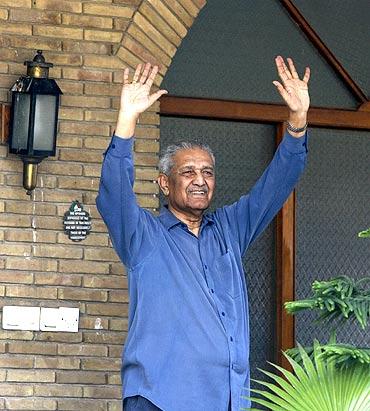
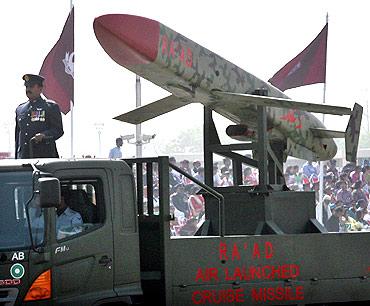
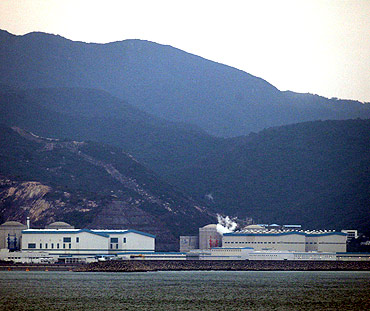
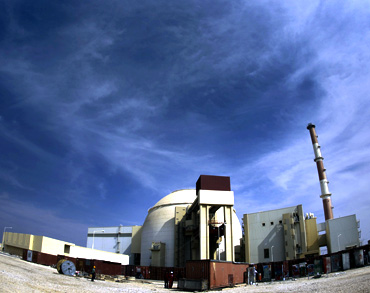
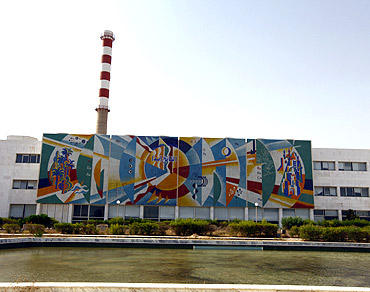
article